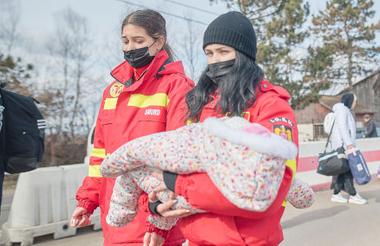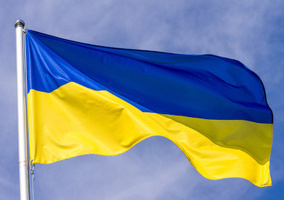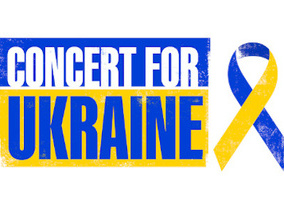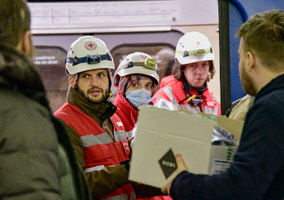Disasters Emergency Committee (DEC) has set the Guinness World Record for the most money raised by an online campaign in one week.
The coalition of aid charities received over £61m in online donations within its first seven days.
This does not include the £25m worth of match-funding from the UK government or other cash from large corporations.
The campaign launched on 3 March, a week after Russia invaded Ukraine.
The DEC Ukraine Humanitarian Appeal has now raised over £300m for people affected by the conflict.
DEC received its first Guinness World Records title in 2004 for its fundraising for the Boxing Day Tsunami. Then it raised the most money online via a website when the British public donated over £10m in just 24 hours.
‘Overwhelmed by the incredible generosity’
DEC is made up of leading charities Action Against Hunger, ActionAid, Age International, British Red Cross, CAFOD, CARE International, Christian Aid, Concern, International Rescue Committee, Islamic Relief, Oxfam, Plan International, Save the Children, Tearfund and World Vision.
Simon Beresford, director of fundraising and marketing for the DEC, said: “We have been overwhelmed by the incredible generosity and outpouring of support from the UK public to the people of Ukraine. It has been heart-warming to see the inspiring fundraising efforts, which are ongoing, with donations flooding in from individuals, companies, schools and arts organisations across the UK.
“We are of course proud and delighted to have taken a part in setting a new world record. However, most importantly what this means is that with the help of the generous UK public DEC charities and their local partners can scale up to respond to help the people of Ukraine. They are working to meet both the immediate and long-term needs of people affected for the months and years to come.”
How does DEC plan to spend the funds?
Funds raised will be spent over a period of three years. Many of the DEC charities DEC began spending funds straight away, and £74.5m will be spent until the end of August, DEC has said.
Some 55% of this will be spent within Ukraine, with the rest being distributed across Poland, Romania, Moldova and Hungary.
DEC’s planned expenditure for the next six months is as follows:
- 28% to be spent on healthcare services, providing items like trauma and first aid kits
- 23% will go towards providing cash to refugees, internally displaced people and more via digital transfers or prepaid cards to meet basic needs
- 16% will be spent on delivering food provisions or food vouchers
- 11% will be spent on supplying safe drinking water, hygiene information and hygiene kits
- 11% will also be spent on psychosocial support for women, children, the elderly and people with disabilities through methods such as stress management training sessions
- 6% will be spent on other – for example, essential services & supplies for those affected by conflict such as internet access, SIM cards and transportation access
- 2% will be spent on bed linen, blankets, towels, kitchen sets, buckets and jerry cans for local communities
- 2% will be spent on capacity building and training, for example, the training of front line partners and staff in humanitarian standards, safeguarding and security
- 1% will be spent on camp management and coordination, e.g. establishing refugee and information centres
Related articles












